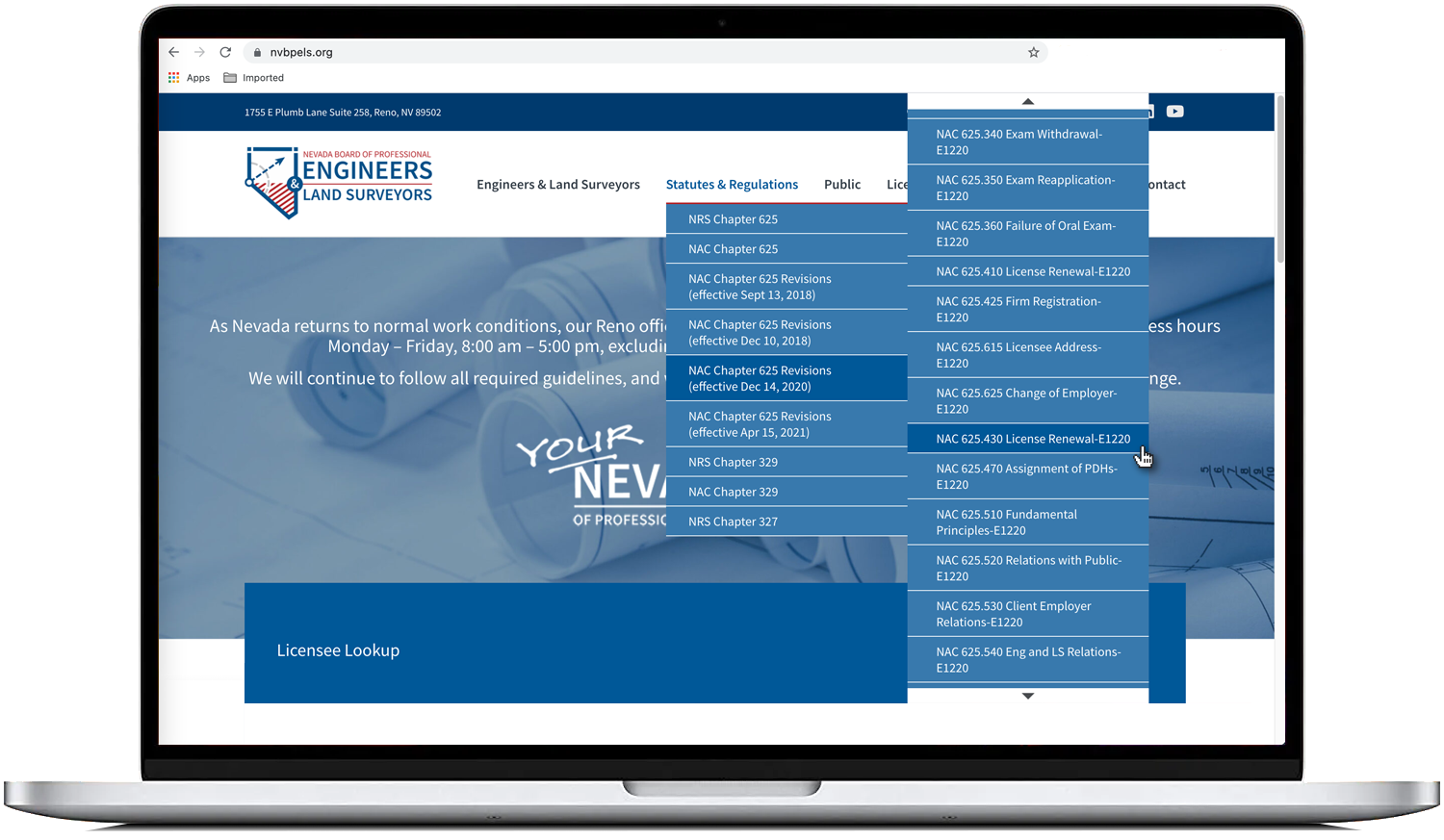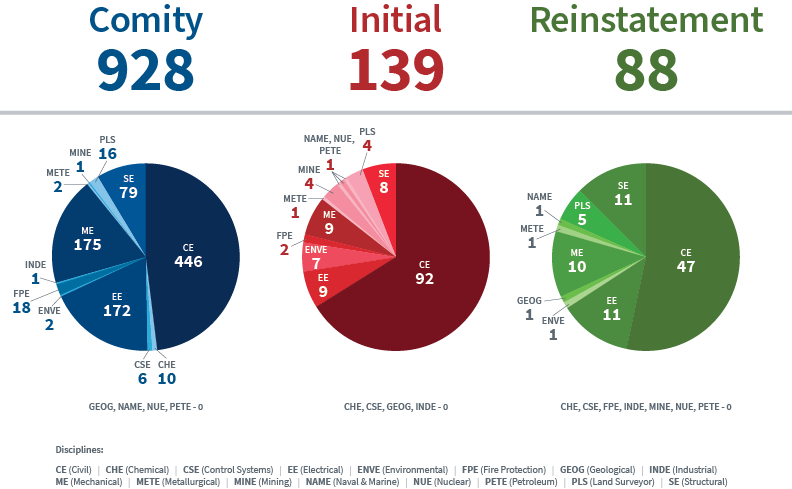
Reflecting on the past year, it’s difficult to imagine that nearly one-year later, we would still be impacted by COVID-19. The board continues to operate at full capacity, and the Reno office continues to be open to visitors (Monday -Friday, 8am to 5pm). Office visitors are asked to practice social distancing and wear face coverings. Because of Governor Sisolak’s directive to state agencies to limit non-essential travel and limits on occupancy to allow for social distancing, the board continues to hold meetings virtually to ensure the public can participate. The board continues to be busy with—
- Updating regulations
- Facilitating discussions on quality of plan submittals
- Improving operations to increase licensing efficiency and customer service
Please check out the articles in this newsletter with details on each of the items listed above.
Did You Know?
By reading the following article you can meet the Nevada Statute and Regulation, Chapter 625, 1 hour professional development hour requirement. For more information, please keep reading.
New Regulations
After a comprehensive review in 2020 of Nevada Administrative Code 625, the board proposed updating 33 regulations.
The 33 regulations were outdated or obsolete–no longer applicable, not compatible with current practices, or an unnecessary barrier. The regulation updates are organized into five groups—1. Housekeeping (Nevada LCB file number R137-20), 2. continuing education (Nevada LCB file number R138-20), 3. Code of conduct (Nevada LCB file number R139-20), 4. Stamping and signing (Nevada LCB file number R140-20), and 5. Complaint investigations (Nevada LCB file number R141-20). The first three groups encompass the 22 regulations that were adopted by the board December 14, 2020. The remaining 11 regulations, group four and five, are still working through the process with the Nevada Legislative Counsel Bureau and the board is anticipating adopting them in the next few months. To see the proposed updates for the 11 regulations, group four and five, currently working through the adoption process, go to:
https://nvbpels.org/wp-content/uploads/2020/12/Category-4.pdf and https://nvbpels.org/wp-content/uploads/2020/12/Category-5.pdf
What’s important for you to know is, when the board adopts regulations, the adopted regulations have full force of the law. You, as a professional, are held to those regulations. The challenge is, if the Nevada online law library, https://www.leg.state.nv.us/NAC/NAC-625.html, isn’t updated timely, you need to know where to find the current regulations that you are held to in your professional practice. That is one of the reasons why the board decided to add the requirement for 1 hour of professional development related to Nevada Statutes and Regulations, Chapter 625. This is balanced with the board adding to its regulations the ability for professionals to meet professional development requirements via self-study.
To read the regulations adopted December 14, 2020, related to continuing education requirements go to page 20 of the pdf.
To see how the December 14, 2020, 15 adopted housekeeping regulations—applications, licensing, contact information, and firm registration—benefit you and/or your business please go to page 5 of the pdf.
For the five code of conduct regulations adopted December 14, 2020, please go to page 25 in the pdf.
The full listing of the regulations adopted in December 2020 is available on the board’s website here:
https://nvbpels.org/wp-content/uploads/2021/02/NAC-Chapter-625-Temporary-Revisions-eff.-Dec-2020.pdf.
In case you missed it in a prior newsletter, or are new to being licensed in Nevada, you might want to look at regulations adopted by the board December 10, 2018. The Nevada Legislative Counsel Bureau made the regulations permanent in January 2019. These regulations updated—
- Scope of practice for a structural engineer
- Written contract requirement disclosing professional liability insurance
- Stamping and sealing professional documents

To read the regulations that were adopted by the board December 10, 2018 and made permanent by the LCB in January 2019, go to NAC Chapter 625 Revisions, Effective January 2019.
To date, none of the adopted regulations in this article have been updated in the Nevada law library, and there is no schedule for when the LCB will update the published regulations. Despite the Nevada law library regulations not being updated, the regulations are in affect and have the full force of law. We encourage you to review our website, NVBPELS.org and be familiar with the updated regulations, these are the regulations by which you are regulated.
If you have questions or need clarification, please feel free to contact the board, board@boe.state.nv.us.
Bottom line—take the time to familiarize yourself with the adopted regulations on our website, they are the law, and you are held to them. Document the one hour you spend reviewing the adopted regulations and you will be ready for your next license renewal as you will have met the new PDH requirement.
Quality of Plan Submittals
NVBPELS has been facilitating on-going discussions at the board’s Professional Association Liaison Committee meetings on quality of plans submitted to public agencies. It has been an enlightening discussion for all participants, including the board. In our last newsletter, we encouraged engineers to refer to the 2020 Blue Book, pages 22-27, to refresh their knowledge on what should be included in plans submitted to a public agency. In this article, we would like to share with you the details of these facilitated discussions and you can consider what action if any you will take in your professional practice—whether your role is working for an agency or working in private practice.
To summarize the discussions, at one end of the spectrum agencies are experiencing poor quality submittals resulting in a high percentage of submittals requiring more than three reviews. When excessive reviews are needed to process submittals, the agency review processes experience significant inefficiencies and increased costs and processing delays. This has ripple effects and impacts the submittal queue.
At the other end of the spectrum, professionals are required to make multiple submittals when each subsequent review identifies new unique comments/changes that need to be addressed. When all comments/changes are not noted during the initial review, it increases project time and costs. This too has ripple effects and impacts the submittal queue.
Between these two ends of the spectrum, there are myriad of reasons that excessive submittal reviews are occurring. From the ongoing discussions, here are the considerations that have bubbled up for each of the groups—
AGENCY CONSIDERATIONS
- Agency resources
- Staff capacity vs project volume
- Revenue collected for reviews/permits
- Costs for reviews/multiple reviews
- Education opportunities
- Customer submittal process
- Submittal quality/agency expectations
- Targeted one-on-one training vs on-demand virtual training
- Submittal process
- Proactive communications—upfront and open communications
- Reviewer continuity—same reviewer cradle to grave
- Mandatory meeting, professional and client, when submittals exceed three reviews
- Referral to the board for incompetency
The agencies reported that approximately 65% of plan submittals require less than three submittal reviews. They would like to see improvement in the remaining 35% to get the submittal number below three reviews. The agencies acknowledged the inefficiencies and cost impacts to their operations as well as to professionals when reviews are excessive—greater than three. Having had the opportunity to have a dialogue with industry through the board’s facilitated discussions, agencies are looking at solutions beyond just adjusting submittal/review fees.
INDUSTRY CONSIDERATIONS
- Education opportunities
- Professional association meeting topics to promote quality submittals
- Consider PDH incentives to encourage wider industry participation in training
- Consider innovative ways to encourage good work at first submittal
- Communication
- Consider how to reach a broader audience—others outside regular lunch meetings
- Submittal process
- Proactive communications—upfront and open communications
- Request/attend pre-submittal meeting
- Request/attend virtual comment review meetings
- Mandatory meeting, professional and client, when submittals exceed three reviews
For industry it was eye opening to hear from the agencies that 35% of submittals require greater than three reviews. Industry was able to share their experience, and in some cases, frustrations, with the submittal process. At times multiple reviewers have differing comments which result in excessive reviews/submittals. Other times there is excessive pressure by clients to prematurely submit plans to get a place in the permitting queue. These discussions are providing an opportunity for industry to have a voice in developing solutions that work for industry and the agencies.
With 35% of submittals exceeding three reviews, the submittal process becomes a circuitous inefficient costly exercise. In simplistic terms, agencies fail to maximize resources, and industry, in their need for timely permits, congest the system.
The board has also become aware that due to market pressures there are plan submittals, approved for permits, that do not include enough information to construct the works without getting the electronic files that created the planned works. The permitted plans lack adequate detail for horizontal and vertical control needed to survey the project and at times to construct the project.
The board will continue the discussions through its Professional Association Liaison Committee. The committee meetings are public meetings, and you are welcome to attend and provide public comment. The board will also continue looking for opportunities to reach a broader group of licensees to continue facilitating the discussion on the quality of plan submittals. This newsletter is one way to communicate the concerns related to quality submittals. We will also consider future blogs to be posted on our website and will be available to speak as requested at professional association events on the topic.
As the discussion evolves on the topic of market pressure and its impact on the contents of plan sets, and the board considers how this topic impacts public safety, the board will likely consider adopting regulations.
There is much work to be done on the topic of quality plan submittals, for the benefit of our communities, we all can play a role in working to improve plans and submittal processes. Please consider what you can do in your professional practice—whether your role is working for an agency or working in private practice.
Nevada By The Numbers
The Nevada Board issued 1,067 professional licenses in 2020. 139 were initial professional licenses (first ever professional license in any state or jurisdiction) and 928 licenses were issued by comity/endorsement (first Nevada professional license, currently hold a professional license in another state or jurisdiction). In addition, 88 Nevada licenses were reinstated.
Breakdown of the disciplines licensed in 2020

April PE Exam
Registration for the April 2021 paper-and-pencil exam administration is now open and will and close on March 4 at 3:00 pm EST. The exam administration will take place over two days—Thursday, April 22 and Friday, April 23.
 Please visit here for more details on the April 2021 exams: https://ncees.org/april-2021-exam-administration-updates/
Please visit here for more details on the April 2021 exams: https://ncees.org/april-2021-exam-administration-updates/
Exams will be scheduled on a first come/first serve basis. REGISTER EARLY to be sure you have a seat to take your PE exam in April!
For candidates that have already registered to take to exams in Nevada, the April exams will be held at the following locations:
Las Vegas – The Orleans Hotel and Casino
Reno – Grand Sierra Resort
ELECTRONIC SUBMITTAL DIGITAL SIGNATURE GUIDE

A reminder from the October 2020 Newsletter, the board, in collaboration with the Digital Signature Task Force, has drafted a guide on Electronic Submittals and Digital Signatures. The intent of the guide is to collapse the learning curve for Nevada licensees in the transition to paperless submittals and initiate a move toward achieving the following goals:
- Establish uniform guidelines for electronic submittals and digital signatures
- Enable consistency amongst public agency requirements for electronic submittals
- Guide professionals in preparing and submitting electronic submittals that conform to
Nevada regulatory and agency requirements - Serve as a resource for public agencies and professionals
Nevada Board Compliance Actions
November 2020 – January 2021
LAZELL PREATOR, PE # 014982
Compliance Case #s 20190008 and 20200003
Violations: NRS 625.410(2), NRS 625.540, NRS 625.560, NAC 625.510, NAC 625.530, and NAC 625.540
Date of Disciplinary Action: January 21, 2021
Previous 2018 Complaint and Stipulated Agreement
Before setting forth the facts for the two complaints at issue, the following summation of a previous Stipulated Agreement is relevant. A Stipulated Agreement was entered by and between the State Board and Mr Preator on November 8, 2018 (“2018 Stipulated Agreement'”), regarding the previous Complaint number 20180006. In the 2018 Stipulated Agreement, Mr Preator acknowledged violations of NRS Chapter 625 in which his conduct constituted gross negligence, incompetence, or misconduct in the practice of professional engineering and failure to exercise due care and oversight in submitting the plan set to the office of the Deputy Building and Safety Director for the City of Las Vegas. The facts pertaining to the 2018 Stipulated Agreement involved the filing of a complaint alleging the submission of plans containing the forged signatures of two senior building officials in an attempt to obtain a building permit.
Specifically, on March 7, 2018, the office of the Deputy Building and Safety Director for the City of Las Vegas received a plan set. The plan set included an irregular and misspelled signature of the City Engineer, Allen Pavelka, with his name signed “Alan” as opposed to the proper spelling “Allen.” The plan set further included a signature of a retired Director of Building and Safety, Chris Knight. Mr Preator asserted that he relied on a third party, Jorge Guzman, to acquire said signatures, and that said third party, unbeknownst to Mr Preator, obtained or affixed the forged signatures. Although Mr Preator denied forging the signatures at issue, he admitted that he is responsible for documents that he seals and signs and that he is responsible to use due care and oversight to manage originals and copies of alI documents he has signed and sealed.
In the 2018 Stipulated Agreement, Mr Preator’s Nevada license was placed on probation for twelve (12) months. As part of his probation, Mr Preator was required to pay certain fines, costs, and fees, and require that he write a Whitepaper on Responsible Charge. The probation under the 2018 Stipulated Agreement has since been completed.
Case No. 20190008 – “Forgery Case”
In regard to Case No. 20190008, a complaint has been submitted against Mr Preator by the Executive Director for the State Board on behalf of a professional land surveyor, alleging fraudulent stamping and signing of legal descriptions.
Specifically, on December 18, 2017, Mr Preator submitted two legal descriptions for a project on Du Fort Avenue to the City of Henderson. The complainant land surveyor inadvertently discovered the two legal descriptions while reviewing projects on the City of Henderson website in August 2019. The two legal descriptions were produced for Preator Consulting by the land surveyor. However, Preator Consulting had not paid for the work, and thus, the land surveyor had not completed the work, as he had not signed or dated the two legal descriptions. The two legal descriptions were, hand signed, dated and submitted to the city on December 18, 2017.
In an effort to explain how the legal descriptions at issue were fraudulently signed, Mr Preator asserts that he relied on the same third-party blamed in the 2018 Stipulated Agreement, ie, Jorge Guzman, to obtain the stamp and signature of the land surveyor before submitting the legal descriptions now at issue. Mr Preator again asserts that Jorge Guzman must have forged the surveyor’s signature before submitting the legal descriptions to the City of Henderson. Although Mr Preator denied forging the signatures at issue, he admits that he is responsible for documents that he submits and that he is responsible to use due care and oversight to manage originals and copies of all said documents.
Mr Preator has not been able to provide any information or documentation regarding his working relationship with Mr Guzman, or any evidence that Mr Guzman exists.
NRS 625.410(2) provides authority for the State Board to administer discipline in Nevada for any gross negligence, incompetency, or misconduct in the practice of professional engineering as a professional engineer. NRS 625.410(5) provides authority for the State Board to administer discipline in Nevada for a violation of any provision of NRS Chapter 625. A licensee violates NRS 625.540 by unlawfully practicing land surveying. Specifically, it is unlawful to present or attempt to use, as his or her own, the license or stamp of another person and to impersonate any other licensee of the same or a different name. Additionally, it is a violation of NRS 625.560 to sign a description unless the person holds an unsuspended and unrevoked license as a professional land surveyor.
NRS 625.4I0(5) provides authority for the State Board to administer discipline in Nevada for a violation of any regulation adopted by the Board. A licensee violates NAC 625.510 by failing to uphold and advance the honor and dignity of the profession by maintaining high standards of ethical conduct regarding honesty. It is a violation of NAC 625.530 for a licensee to fail to act in professional matters as a faithful agent. A licensee violates NAC 625.540(1) by failing to take care that credit for engineering or land surveying work is given to those to whom credit is properly due and violates NAC 625.540(4) by failing to not maliciously injure the professional reputation, business prospects or practice of another engineer or land surveyor.
Based on the foregoing, Mr Preator stipulates that he violated NRS 625.410 (2), in that his conduct constituted gross negligence, incompetence, or misconduct in the practice of professional engineering. Mr Preator stipulates that he violated NRS 625.540 by unlawfully practicing land surveying by presenting the license or stamp of another person and by impersonating another licensee. Likewise, Mr Preator stipulates that he violated NRS 625.560 by signing a description without a license as a professional land surveyor.
Further, Mr Preator stipulates that he violated NAC 625.510 by failing to uphold and advance the honor and dignity of the profession by maintaining high standards of ethical conduct regarding honesty. In addition, Mr Preator stipulates that he violated NAC 625.530 by failing to act in professional matters as a faithful agent. Finally, Mr Preator stipulates that he violated NAC 625.540 by failing to take care that credit for land surveying work was given to those to whom credit was properly due and by failing to not maliciously injure the professional reputation, business prospects or practice of another engineer or land surveyor.
Case No. 20200003 – “Faithful Agent Case”
In regard to Case No. 20200003, a complaint has been submitted against Mr Preator alleging misconduct and failure to meet terms of a contract.
Specifically, on February 2, 2018, the complainant contracted with Mr Preator to provide civil engineering for an auto body repair shop construction project, and paid Mr Preator a $7,100 retainer. Per the contract, Mr Preator was to begin working on the project within two days of receiving the retainer. Between February 2018 and February 2020, no work product was provided to the client nor to the professionals and contractors working on the client’s behalf. There were various interactions and requests for updates on the status of the project. Mr Preator asserts that, during the project, he was unable to speak with the architect on the project, from whom Mr Preator asserts that he received differing site plans. Nevertheless, Mr Preator informed the client that various items were under review by planning authorities, even though they were never actually submitted.
NRS 625.410(2) provides authority for the State Board to administer discipline in Nevada for any gross negligence, incompetency, or misconduct in the practice of professional engineering as a professional engineer. NRS 625.410(5) provides authority for the State Board to administer discipline in Nevada for a violation of any regulation adopted by the Board. A licensee violates NAC 625.510 by failing to uphold and advance the honor and dignity of the profession by maintaining high standards of ethical conduct regarding honesty. It is a violation of NAC 625.530 when a licensee fails to act in professional matters as a faithful agent.
Based on the foregoing, Mr Preator stipulates that he violated NRS 625.410(2), in that his conduct constituted gross negligence, incompetence, or misconduct in the practice of professional engineering. Further, Mr Preator stipulates that he violated NAC 625.510 by failing to uphold and advance the honor and dignity of the profession by maintaining high standards of ethical conduct regarding honesty. Finally, Mr Preator stipulates that he violated NAC 625.530 by failing to act in a timely and professional matters as a faithful agent.
Pursuant to NAC 625.640, a disciplinary matter may be resolved without a formal hearing by a Stipulated Agreement. To that end, to resolve Complaint Numbers 2019008 and 20200003, Mr Preator and the State Board resolve this matter on the following basis:
(1) Mr Preator’s Nevada license shall be suspended for thirty-six (36) months following entry of this Agreement, pursuant to NRS 625.410 (2) and NAC 625.530, but with the suspension stayed and probation imposed for the duration of that time period.
(2) The stay of Mr Preator’s suspension may be lifted by the State Board upon notice and the opportunity to be heard should Mr Preator fail to abide by the terms hereof.
(3) Mr Preator’s successful completion of probation is expressly conditioned upon his full compliance with the following conditions of probation:
(a) Mr Preator shall pay a fine of Five Thousand Dollars ($5,000.00) for the Forgery Case and a fine of Two Thousand Dollars ($2,000.00) for the Faithful Agent Case, for a total fine of Seven Thousand Dollars ($7,000.00), within six (6) months of acceptance and execution of this Agreement by the State Board.
(b) Mr Preator shall pay the professional land surveyor in full under his contract therewith for work on the Du Fort project.
(c) Mr Preator shall pay for cost of hiring a Nevada licensed professional land surveyor to review, re-stamp and sign the Du Fort legal descriptions.
(d) Mr Preator shall immediately notify client and the relevant public entity via letter, with copy to the Board, of the necessity of the Du Fort legal descriptions to be re submitted with lawful stamping and signature.
(e) Mr Preator shall reimburse in full the deposited amount the complainant paid for the Autobody Repair Shop project.
(f) Mr Preator shall pay the State Board Two Thousand Seven Hundred Sixty-Nine and 50/100 Dollars ($2,769.50) as reimbursement of administrative expenses in this matter.
(g) Mr Preator registering in, paying for and completing an entry level ethics course with Texas Tech University Murdough Center for Engineering Professionalism, and providing proof of completion thereof to Board staff.
(h) Mr Preator shall provide to the State Board staff, within thirty (30) days of execution of this agreement by the State Board, a list of projects that were submitted for governmental review in 2017 and 2018, and provide project names, clients, and to which agencies submissions were made. These submissions will be reviewed by State Board staff to determine and identify any other possible statutory and/or regulatory violations.
(i) Mr Preator shall submit detailed bi-monthly probation reports to the Executive Director of the Nevada Board, which shall report any work completed in Nevada during the previous two (2) month period. A report shall be filed even if no work is performed in Nevada during the previous two (2) month period. The first report shall be due within two (2) months of the effective date of this Stipulated Agreement. Each report shall include client contact information and a copy of the contract executed for any work in Nevada, including the scope of work detail.
(j) Mr Preator shall provide proof of the completion of thirty (30) professional development hours that are required on a biennial basis for license renewal, pursuant to NAC 625.430 and NAC 625.480.


